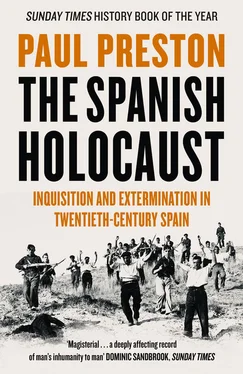In Valladolid, Onésimo devoted ever more time to the conversion of his forty-odd followers into warriors of what he now called ‘organized anti-communist militias’. Soon they would be involved in bloody clashes with left-wing students and workers in the University and in the streets of Valladolid. Pistols were being bought and much time was spent on training. Already by the spring of 1932, Onésimo Redondo was writing about the civil war to come – ‘The war is getting nearer; the situation of violence is inevitable. There is no point in rejecting it. It is stupid to flee from making war when they are going to make war on us. The important thing is to prepare to win, and, to win, it is necessary to seize the initiative and go on to the attack.’ On 3 May 1932, a pitched battle was fought with the left in the main square of Valladolid after which more than twenty people were hospitalized. Onésimo himself was sentenced to two months in prison for the excesses of Libertad. 50
Imprisonment did nothing to mellow Onésimo Redondo. His article in the fascist monthly JONS in May 1933 reflected the growing virulence of his thought and echoed Sanjurjo’s identification of the Spanish working class with the Arabs:
Marxism, with its Mohammedan utopias, with the truth of its dictatorial iron and with the pitiless lust of its sadistic magnates, suddenly renews the eclipse of Culture and freedoms like a modern Saracen invasion … This certain danger, of Africanization in the name of Progress, is clearly visible in Spain. We can state categorically that our Marxists are the most African of all Europe … Historically, we are a friction zone between that which is civilized and that which is African, between the Aryan and the Semitic … For this reason, the generations that built the fatherland, those that freed us from being an eternal extension of the Dark Continent, raised their swords against attacks from the south and they never sheathed them … The great Isabel ordered Spaniards always to watch Africa, to defeat Africa and never be invaded by her again. Was the Peninsula entirely de-Africanized? Is there not a danger of a new kind of African domination, here where so many roots of the Moorish spirit remained in the character of a race in the vanguard of Europe? We ask this important question dispassionately and we will answer it right away by underlining the evident danger of the new Africanization: ‘Marxism’. Throughout the world, there exists the Jewish or Semite conspiracy against Western civilization, but in Spain it can more subtly and rapidly connect the Semitic element, the African element. It can be seen flowering in all its primitive freshness in our southern provinces, where Moorish blood lives on in the subsoil of the race … The follower of Spanish Marxism, especially the Andalusian, soon takes the incendiary torch, breaks into manor houses and farms, impelled by the bandit subconscious, encouraged by the Semites of Madrid; he wants bread without earning it, he wants to laze around and be rich, to take his pleasures and to take his revenge … and the definitive victory of Marxism will be the re-Africanization of Spain, the victory of the combined Semitic elements – Jews and Moors, aristocrats and plebeians who have survived ethnically and spiritually in the Peninsula and in Europe. 51
By linking Marxism as a Jewish invention and its alleged threat of a ‘re-Africanization’ of Spain, Redondo was identifying Spain’s two archetypal ‘others’, the Jew and the Moor, with the Republic. His conclusion, shared by many on the right, was that a new Reconquista was needed to prevent Spain from falling into the hands of the modern foes. His views on the legitimacy of violence were similar to those of the Catholic extreme right exemplified by the writings of Castro Albarrán. 52
Anti-Semitism could be found across most of the Spanish right. In some cases, it was a vague sentiment born of traditional Catholic resentment about the fate of Jesus Christ, but in others it was a murderous justification of violence against the left. Curiously, the virulence of Onésimo Redondo constituted something of an exception within Spain’s nascent fascist movement. Ledesma Ramos regarded anti-Semitism as having relevance only in Germany. 53The Falangist leader, José Antonio Primo de Rivera, had little or no interest in the ‘Jewish problem’ except when it came to the Jewish–Marxist influence over the working class. Nevertheless, the Falangist daily Arriba claimed that ‘the Judaic–Masonic International is the creator of the two great evils that have afflicted humanity: capitalism and Marxism’. José Antonio Primo de Rivera shared with other rightists a belief that violence was legitimate against a Republic that he perceived as influenced by Jews and Freemasons. 54He approved of attacks by Falangists on the Jewish-owned SEPU department stores in the spring of 1935. 55
The identification of the working class with foreign enemies was based on a convoluted logic whereby Bolshevism was a Jewish invention and the Jews were indistinguishable from Muslims and thus leftists were bent on subjecting Spain to domination by African elements. Thus hostility to the Spanish working class was presented as a legitimate act of Spanish patriotism. According to another of the Acción Española group, the one-time liberal turned ultra-rightist Ramiro de Maeztú, the Spanish nation had been forged in its struggles against the Jews (arrogant usurers) and the Moors (savages without civilization). 56In one of his articles, the monarchist leader José Calvo Sotelo neatly encapsulated the racist dimension of the anti-leftist discourse when he referred to the Socialist leader Francisco Largo Caballero as ‘a Moroccan Lenin’. 57José Antonio Primo de Rivera also shared this association of the left with the Moors. In his reflections in prison in 1936, he interpreted all of Spanish history as an endless struggle between Goths and Berbers. The spirit of the former lived on in monarchical, aristocratic, religious and military values while that of the latter was to be found in the rural proletariat. He denounced the Second Republic as a ‘new Berber invasion’ signifying the demolition of European Spain. 58
Gil Robles, if less explicitly than Sanjurjo or Onésimo Redondo, also conveyed the view that violence against the left was legitimate because of its racial inferiority. His frequent use of the word ‘reconquest’ linked enmity towards the left in the 1930s to the central epic of Spanish nationalism, the battle to liberate Spain from Islam between 722 and 1492. During his campaign for the elections of November 1933, on 15 October in the Monumental Cinema of Madrid, he declared: ‘We must reconquer Spain … We must give Spain a true unity, a new spirit, a totalitarian polity … For me there is only one tactic today: to form an anti-Marxist front and the wider the better. It is necessary now to defeat socialism mercilessly.’ At this point, Antonio Goicoechea, the leader of the extreme rightist Acción Española group, was made to stand and received a tumultuous ovation. Gil Robles continued his speech in language indistinguishable from that of the conspiratorial right:
We must found a new state, purge the fatherland of judaizing Freemasons … We must proceed to a new state and this imposes duties and sacrifices. What does it matter if we have to shed blood! … We need full power and that is what we demand … To realize this ideal we are not going to waste time with archaic forms. Democracy is not an end but a means to the conquest of the new state. When the time comes, either parliament submits or we will eliminate it. 59
Gil Robles’s speech was described by El Socialista as an ‘authentic fascist harangue’. On the left, it was perceived as the real policy of his ostensibly moderate mass party, the CEDA (Confederación Española de Derechas Autónomas). Certainly, his every sentence had been greeted by ecstatic applause. Fernando de los Ríos, Minister of Education and Fine Arts since October 1931, a moderate Socialist and a distinguished professor of law, had suffered anti-Semitic abuse for his policy of toleration for Jewish schools and his expressions of sympathy for the Sephardic community in Morocco. He pointed out that Gil Robles’s call for a purge of Jews and Freemasons was a denial of the juridical and political postulates of the Republic. 60CEDA election posters declared that Spain must be saved from ‘Marxists, Freemasons, Separatists and Jews’. The entire forces of the left – anarchists, Socialists, Communists, liberal Republicans, regional nationalists – were denounced as anti-Spanish. 61Violence against them was therefore both legitimate and indeed an urgent patriotic necessity.
Читать дальше












